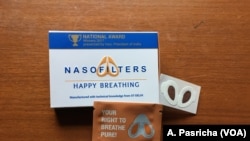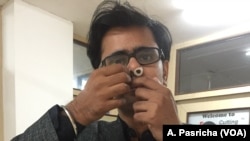From VOA Learning English, this is the Health & Lifestyle report.
In parts of India, it is not uncommon to see people wearing a mask over their nose and mouth.
The capital, New Delhi, has some of the world's dirtiest air. The pollution was a "call for action" for researchers at the Indian Institute of Technology Delhi.
A team from that university has developed an alternative method to help people guard against heavy air pollution.
The researchers invented a small respiratory filter that is placed in the nose. The device is designed to stop most dust and air pollutants from entering the body without restricting breathing.
On its website, America’s Environmental Protection Agency (EPA) defines particulate matter as “a mixture of solid particles and liquid droplets found in the air.”
Doctors say that extremely small particulate matter, called PM2.5 cause the most severe damage to lungs.
The invention, called Nasofilters, won the Indian President's "National Startups Award" in May 2017. It was also named in South Korea's 2017 list of the "Top 50 technical startups in the world."
The idea of nasal filters is not new.
Some filters are available in Western countries to help allergy sufferers. They experience a physical reaction after breathing or touching something that is harmless to most people.
One study completed in 2016 looked at a nasal filter made in Denmark. It found that the product reduced signs of an allergic reaction, and it was easy to use.
The Indian nose filter, however, was created to deal with air pollution. In New Delhi, pollution from vehicles, dust from building projects and the burning of waste combine to make air quality levels rise to 30 times the safe limit in winter weather.
The filter is shaped like a finger nail. The dark brown cover is made of millions of small-sized holes and looks like a fine cloth.
The inventors wanted to make something effective, easy to use and affordable. The filter costs about 16 cents. It works for about eight hours, and researchers say it can remove about 95 percent of the pollutants.
Prateek Sharma is one of the inventors. He started working on the device with others after he was admitted as a student at the Indian Institute of Technology.
Why did he get involved? His mother suffers from asthma.
Sharma says the story of Nasofilter began about 10 years ago. He noticed that his mother was always wearing some kind of cloth on her face. But she would not wear a face mask when she left home. So, he wanted to find another solution for her.
He says the air pollution problem is big, but the Nasofilter is small. He explains that the product is easy to wear and doesn't look bad.
On days when Indian officials say air pollution is severe, doctors advise people against outdoor activities. This is especially the case with children and older adults.
But many people cannot or don't want to stay indoors. And they may not want to wear a face mask. This may make the new nose filters popular with Indian consumers.
A retired army officer who lives in Delhi read about the nose filters in a newspaper. He and his wife traveled to the Indian Institute of Technology to learn more.
He describes himself and his wife as "outdoor people." He says the nose filter is an "excellent idea" -- it’s comfortable, doesn't look bad and works.
While products like Nasofilter may help people breathe easier, environmental activists note the need to deal with issues causing the air pollution in the first place. The World Health Organization lists nine other Indian cities on its list of the world's 20 most polluted cities.
And that's the Health & Lifestyle report. I'm Anna Matteo.
Anjana Pasricha reported this story from New Delhi for VOANews.com. Anna Matteo adapted her report for Learning English. George Grow was the editor.
______________________________________________________________
QUIZ
______________________________________________________________
Words in This Story
alternative – adj. offering or expressing a choice
respiratory – adj. the movement of air or dissolved gases into and out of the lungs
filter – n. a device that is used to remove something unwanted from a liquid or gas that passes through it
particle – n.
PM2.5 – n. fine inhalable particles, with diameters that are generally 2.5 micrometers and smaller
allergy – n. a medical condition that causes someone to become sick after eating, touching, or breathing something that is harmless to most people
nail – n. the hard covering at the end of a finger or toe the hard covering at the end of a finger or toe
affordable – adj. having a cost that is not too high
start-up – n. a fledgling business enterprise
consumer – n. a person who buys goods and services








